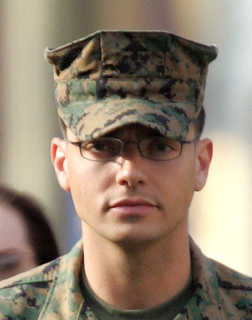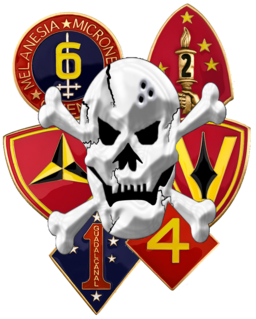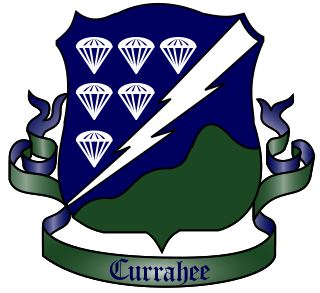A company is a military unit, typically consisting of 80–250 soldiers and usually commanded by a major or a captain. Most companies are formed of three to seven platoons, although the exact number may vary by country, unit type, and structure.

A platoon is a military unit typically composed of two or more squads, sections, or patrols. Platoon organization varies depending on the country and the branch, but a platoon can be composed of 50 people, although specific platoons may range from 10 to 100 people. A platoon is typically the smallest military unit led by a commissioned officer. The platoon leader is usually a junior officer—a second or first lieutenant or an equivalent rank. The officer is usually assisted by a platoon sergeant.
In military terminology, a squad is amongst the smallest of military organizations and is led by a non-commissioned officer. NATO and US doctrine define a squad as an organization "larger than a team, but smaller than a section." while US Army doctrine further defines a squad as a "small military unit typically containing two or more fire teams." In US usage, a squad consists of eight to fourteen soldiers, and may be further subdivided into fireteams.
Bravo Two Zero was the call sign of an eight-man British Army Special Air Service (SAS) patrol, deployed into Iraq during the First Gulf War in January 1991. According to Chris Ryan's account, the patrol was given the task of gathering intelligence, finding a good lying-up position (LUP), setting up an observation post (OP), and monitoring enemy movements, especially Scud missile launchers on the Iraqi Main Supply Route (MSR) between Baghdad and North-Western Iraq; however, according to Andy McNab's account, the task was to find and destroy Iraqi Scud missile launchers along a 250 km (160 mi) stretch of the MSR.

John Henry "Jack" "Doc" Bradley was a United States Navy Hospital corpsman who was awarded the Navy Cross for extraordinary heroism while serving with the Marines during the Battle of Iwo Jima in World War II. During the battle, he was a member of the patrol that captured the top of Mount Suribachi and raised the first U.S. flag on Iwo Jima on February 23, 1945.

Ilario Gregory Pantano is a former United States Marine Corps second lieutenant. He has also been an author, a television commentator, and served as a Deputy Sheriff in Wilmington, North Carolina. He was a Republican Party nominee for the US House of Representatives in 2010.

Colour Sergeant Johnson Gideon Beharry, VC, COG is a British Army soldier who, on 18 March 2005, was awarded the Victoria Cross, the highest military decoration for valour in the British and Commonwealth armed forces, for saving members of his unit, the 1st Battalion Princess of Wales's Royal Regiment, from ambushes on 1 May and again on 11 June 2004 at Al-Amarah, Iraq. He sustained serious head injuries in the latter engagement. Beharry was formally invested with the Victoria Cross by Queen Elizabeth II on 27 April 2005.

The United States Marine Corps Reconnaissance Battalions are the Special Operations Capable reconnaissance assets of Marine Air-Ground Task Force that provide division-level ground and amphibious reconnaissance to the Ground Combat Element within the United States Marine Corps. Division reconnaissance teams are employed to observe and report on enemy activity and other information of military significance in close operations. The Military Occupational Specialty code for Reconnaissance Marine is 0321.

R-Point is a 2004 South Korean psychological horror wartime film written and directed by Kong Su-chang. Set in Vietnam in 1972, during the Vietnam War, it stars Kam Woo-sung and Son Byong-ho as members of the South Korean Army in Vietnam. Most of the movie was shot in Cambodia. Bokor Hill Station plays a prominent part of the movie, in this case doubling as a French colonial plantation. In 2011, Palisades Tartan re-released this film on DVD under the title Ghosts of War.

The Haditha massacre was a series of killings on November 19, 2005, in which a group of United States Marines killed 24 unarmed Iraqi civilians. The killings occurred in Haditha, a city in Iraq's western province of Al Anbar. Among the dead were men, women, elderly people and children as young as 1, who were shot multiple times at close range while unarmed. It was alleged that the killings were a response to the attack on a convoy of Marines with an improvised explosive device that killed Lance Corporal Miguel Terrazas.
The Hamdania incident refers to the alleged kidnapping and subsequent murder of an Iraqi man by United States Marines on April 26, 2006 in Al Hamdania, a small village west of Baghdad near Abu Ghraib. An investigation by the Naval Criminal Investigative Service resulted in charges of murder, kidnapping, housebreaking, larceny, Obstruction of Justice and conspiracy associated with the alleged coverup of the incident. They were forced to drop many charges on the defendants. The defendants are seven Marines and a Navy Corpsman. As of February 2007, five of the defendants have negotiated pleas to lesser charges of kidnapping and conspiracy, or less, and have agreed to testify in these trials. Additional Marines from the same battalion faced lesser charges of assault related to the use of physical force during interrogations of suspected insurgents. Those charges were dropped.

Captain John James McGinty III was a United States Marine Corps officer who received the United States militaries' highest decoration — the Medal of Honor — for heroism during July 1966 in the Vietnam War.

Richard Huck is a retired United States Marine Corps officer. Huck served as Commanding General of the 2nd Marine Division from 2004 until June 16, 2006. Huck is currently serving as Assistant Deputy Commandant for Plans, Policies and Operations, Headquarters Marine Corps.

E Company, 2nd Battalion of the 506th Parachute Infantry Regiment of the 101st Airborne Division, the "Screaming Eagles", is a company in the United States Army. The company was referred to as "Easy" based on the WWII phonetic alphabet because it was the fifth lettered company in the 506th. The experiences of its members during World War II are the subject of the HBO miniseries Band of Brothers based on the book of the same name by historian Stephen Ambrose.

Bryan James Budd, was a British Army soldier and a Northern Irish recipient of the Victoria Cross, the highest award for gallantry in the face of the enemy that can be awarded to British and Commonwealth forces.
Generation Kill is an American seven-part television miniseries produced for HBO that aired from July 13 to August 24, 2008. It is based on Evan Wright's 2004 book about his experience as an embedded reporter with the US Marine Corps' 1st Reconnaissance Battalion during the 2003 invasion of Iraq, adapted for television by David Simon, Ed Burns, and Wright. The miniseries was directed by Susanna White and Simon Cellan Jones and produced by Andrea Calderwood. The ensemble cast includes Alexander Skarsgård as Sergeant Brad 'Iceman' Colbert, James Ransone as Corporal Josh Ray Person, and Lee Tergesen as Wright.

Justin D. LeHew is a United States Marine who served in the War on Terror. He was awarded the Navy Cross for his actions on 23 and 24 March 2003 during the initial 2003 invasion of Iraq. He was hand picked to spearhead the rescue operation and recovery of the U.S. Army's 507th Maintenance Company on 23 March and subsequently was called upon again to take part in the rescue operation of US Army Private Jessica Lynch on 1 April 2003. He is also a recipient of the Bronze Star with Combat Distinguishing Device denoting Valor for his heroic actions from 5 to 28 August 2004 during the Battle of Najaf.
Hispanics in the United States Marine Corps, such as Private France Silva who during the Boxer Rebellion became the first Marine of the thirteen Marines of Latin American descent to be awarded the Medal of Honor, and Private First Class Guy Gabaldon who is credited with capturing over 1,000 enemy soldiers and civilians during World War II, have distinguished themselves in combat. Hispanics have participated as members of the United States Marine Corps in the Boxer Rebellion, World War I, the American intervention in Latin America also known as the Banana Wars, World War II, the Korean War, the Vietnam War, the Gulf War and most recently in the military campaigns of Afghanistan and Iraq.

Michael Chase Behenna is a former United States Army First Lieutenant who was convicted of the 2008 murder of Ali Mansur Mohamed during the occupation of Iraq. Behenna is colloquially associated with a group of U.S. military personnel convicted of war crimes known as the Leavenworth 10. He was sentenced to 25 years imprisonment, which was later reduced to 15 years, and served his sentence in the United States Disciplinary Barracks on Fort Leavenworth, a United States Army post in Kansas. He was granted parole on March 14, 2014, after serving less than five years of his sentence. Since his release from prison he has worked as a farmhand. On May 6, 2019, Behenna received a pardon from President Donald Trump.











